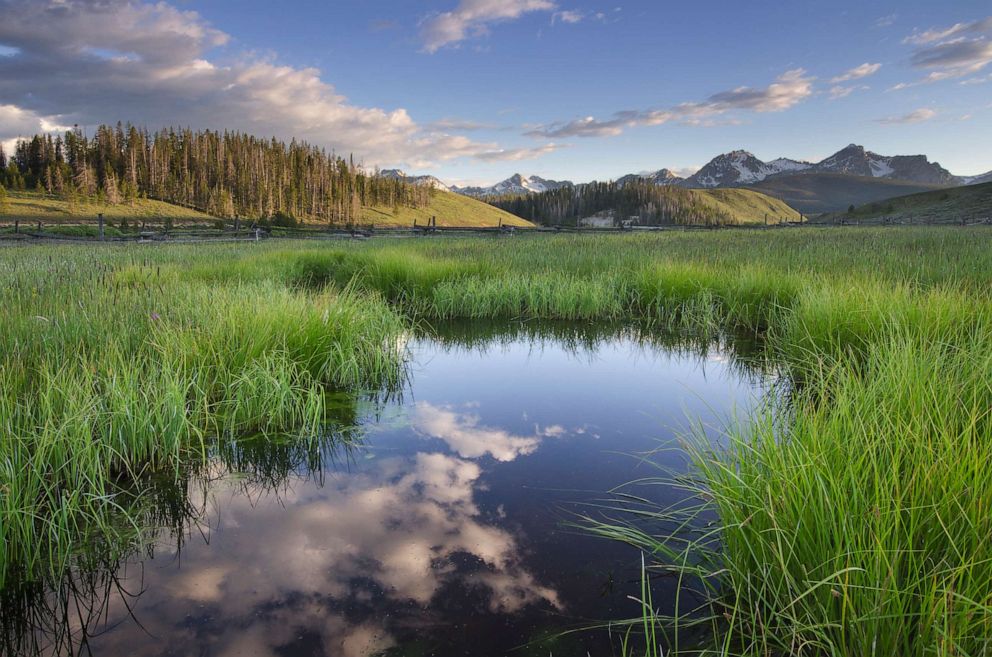分歧严重的最高法院周四大幅撤销了联邦政府根据《湿地保护法》对湿地的保护措施洁净水法案在限制环境保护局权力的决定中,支持爱达荷州的财产所有者。
该案件,Sackett v. EPA,使迈克尔和Chantell Sackett对EPA监管机构的投标,建立一个家庭住宅附近的牧师湖在爱达荷州北部。
政府表示,他们的土地符合受保护湿地的条件,需要昂贵的建设许可,而这家人认为,他们的财产与湖泊没有直接联系,环保局的宽泛规定有些过分。
1972年的《洁净水法案》允许政府为“美国水域”的污染制定规则,但多年来,法律对邻近湿地的覆盖范围一直在激烈辩论,也不清楚。
2017年,一个分裂的最高法院表示,美国环保署可以监管任何与可通航水域有“重要联系”的湿地,如河流、湖泊和海洋。
但周四,塞缪尔·阿利托大法官在萨克特案件中为五名大法官的多数意见撰文说,现有的标准太宽泛,太难执行,对财产所有者来说太“不稳定”。
“我们认为[《清洁水法》]只适用于那些实际上与美国水域没有区别的湿地,”阿利托写道。
他说,环保署只能监管“与传统的州际通航水域相连的相对永久的水体”附近的湿地,以及“与该水域有连续表面联系,从而很难确定‘水’的尽头和‘湿地’的起点。”
“与传统通航水域分离的湿地不能被视为这些水域的一部分,即使它们位于附近,”阿利托写道。
这一决定实际上将大大减少受《洁净水法案》保护的湿地数量。它还将为财产所有者提供更大的透明度和灵活性,在不受政府监管的情况下使用他们的土地。
“法院的裁决将《洁净水法案》的范围恢复到了最初和适当的限度,”太平洋法律基金会的高级律师达米安·希夫说,他为该案进行了辩护。“法院现在有了联邦监管机构衡量公平性和一致性的明确标准。今天的裁决是财产权和宪法分权的重大胜利。”
阿利托与首席大法官约翰·罗伯茨、大法官克拉伦斯·托马斯、尼尔·戈萨奇和艾米·科尼·巴雷特一起采用了新的、更为严格的湿地保护“连续地表连接”标准。
所有法官都同意,特别是萨克特夫妇的财产,不应该根据《清洁水法》(Clean Water Act)作为湿地进行监管,但特朗普任命的大法官布雷特·卡瓦诺(Brett Kavanaugh)加入了自由派大法官埃琳娜·卡根、索尼娅·索托马约尔和凯坦吉·布朗·杰克逊(Ketanji Brown Jackson)的行列,强烈认为大多数人的推理走得太远了。
“通过将法案对湿地的覆盖范围缩小到仅邻近的湿地,法院的新测试将使一些长期受监管的邻近湿地不再被《清洁水法》覆盖,这对美国各地的水质和洪水控制产生重大影响,”卡瓦诺为少数派写道。

爱达荷州锯齿山斯坦利盆地的湿地。
股票照片/盖蒂图片
环境保护署署长迈克尔·里根说,该署对高等法院的裁决感到失望,并说它“侵蚀了长期的清洁水保护。”
“拜登-哈里斯政府一直致力于建立一个持久的‘美国水域’定义,以保护我们国家的水域,加强经济机会,保护人民的健康,同时为农民、牧场主和土地所有者提供应有的清晰度和确定性,”里根在一份声明中说。“在我们仔细审查最高法院的裁决并考虑下一步措施时,这些目标将继续指导该机构向前发展。”
白宫表示,这一决定“旨在让我们的国家倒退。”
“这将危及农民、企业和数百万美国人的清洁饮用水来源,”新闻秘书郭佳欣·让-皮埃尔在周四下午的视频简报会上说。
环保组织表示,这一决定是一个巨大的挫折。
“萨克特案的判决使《洁净水法案》半个世纪以来所取得的进步付之东流。近9000万英亩以前受保护的湿地现在面临着来自污染者和开发商的生存威胁,”参与此案的倡导组织地球正义(Earthjustice)的项目副总裁萨姆·桑卡(Sam Sankar)说。
塞拉俱乐部执行董事本·杰里斯说,被削弱的规则将产生直接影响。
“数百万美国人的安全饮用水将会比上一代人少,”吃醋协会在一份声明中说。“这场战斗远未结束。”
Jean-Pierre说,拜登政府的律师正在“仔细审查这项决定”。
Supreme Court cuts EPA's Clean Water Act protection for wetlands
A sharply divided Supreme Court on Thursday significantly rolled back federal safeguards for wetlands under theClean Water Act, siding with Idaho property owners in a decision that curbs Environmental Protection Agency power.
The case, Sackett v. EPA, pitted Michael and Chantell Sackett against EPA regulators over a bid to build a family home adjacent to Priest Lake in northern Idaho.
The government said their land qualifies as a protected wetland, requiring an expensive permit for construction, while the family argued that its property is not directly connected to the lake and that the broad EPA regulations are an overreach.
The Clean Water Act of 1972 allows the government to set rules for pollution in "waters of the United States," but for years, the extent to which adjacent wetlands are covered by the law has been hotly debated and unclear.
In 2017, a fractured Supreme Court said that the EPA can regulate any wetlands with a "significant nexus" to navigable waters, like rivers, lakes and oceans.
But Thursday, Justice Samuel Alito, writing for a five-justice majority in the Sackett case, said the existing standard is too broad, too difficult to enforce and too "precarious" for property owners.
"We hold that the [Clean Water Act] extends to only those wetlands that are as a practical matter indistinguishable from waters of the United States," Alito wrote.
He said the EPA could only regulate wetlands adjacent to a "relatively permanent body of water connected to traditional interstate navigable waters" and having a "continuous surface connection with that water, making it difficult to determine where the 'water' ends and the 'wetland' begins."
"Wetlands that are separate from traditional navigable waters cannot be considered part of those waters, even if they are located nearby," Alito wrote.
The decision will in effect significantly reduce the number of wetlands protected by the Clean Water Act. It will also provide property owners with greater clarity and flexibility in utilizing their land free from government regulation.
"The Court's ruling returns the scope of the Clean Water Act to its original and proper limits," said Damien Schiff, a senior attorney at Pacific Legal Foundation who argued the case. "Courts now have a clear measuring stick for fairness and consistency by federal regulators. Today's ruling is a profound win for property rights and the constitutional separation of powers."
Alito was joined by Chief Justice John Roberts and Justices Clarence Thomas, Neil Gorsuch and Amy Coney Barrett in adopting the new, more stringent "continuous surface connection" standard for which wetlands are protected.
All of the justices agreed that the Sacketts' property, specifically, should not have been regulated as a wetland under the Clean Water Act, but Trump-appointed Justice Brett Kavanaugh joined liberal Justices Elena Kagan, Sonia Sotomayor and Ketanji Brown Jackson in strongly arguing that the majority had gone too far with its reasoning.
"By narrowing the Act's coverage of wetlands to only adjoining wetlands, the Court's new test will leave some long-regulated adjacent wetlands no longer covered by the Clean Water Act, with significant repercussions for water quality and flood control throughout the United States," Kavanaugh wrote for the minority.
EPA administrator Michael Regan said the agency was disappointed by the high court's decision and that it "erodes longstanding clean water protections."
"The Biden-Harris Administration has worked to establish a durable definition of 'waters of the United States' that safeguards our nation's waters, strengthens economic opportunity, and protects people's health while providing the clarity and certainty that farmers, ranchers, and landowners deserve," Regan said in a statement. "These goals will continue to guide the agency forward as we carefully review the Supreme Court decision and consider next steps."
The White House said the decision "aims to take our country backwards."
"It will jeopardize the sources of clean drinking water for farmers, businesses and millions of Americans," press secretary Karine Jean-Pierre said at her on-cam briefing Thursday afternoon.
Environmental groups said the decision is a huge setback.
"The Sackett decision undoes a half-century of progress generated by the Clean Water Act. Almost 90 million acres of formerly protected wetlands now face an existential threat from polluters and developers," said Sam Sankar, vice president of Programs at Earthjustice, an advocacy group that had weighed in on the case.
Sierra Club Executive Director Ben Jealous said the weakened rules would have a direct impact.
"Millions of Americans will have less safe drinking water than the generation before them," Jealous said in a statement. "This fight is far from over."
Biden administration lawyers are "carefully reviewing the decision," per Jean-Pierre.
ABC N






